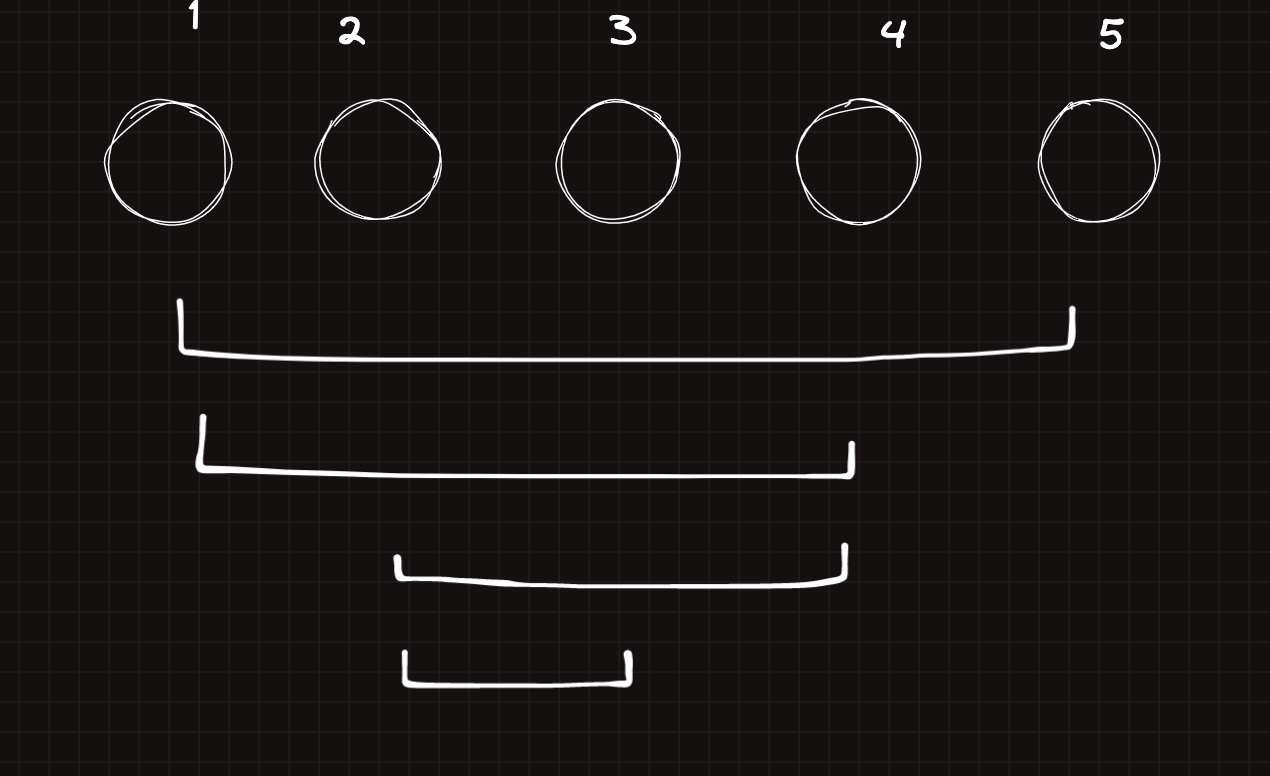Codeforces Round 865 (Div. 2) - D. Sum Graph (2000)
문제에 대한 감은 금방 잡았으나 까다로운 구현때문에 너무 많은 시간을 썼다.
내가 한 관찰은 다음과 같다.
로 쿼리를 날리면

이런식으로 간선을 구성해줄 수 있고 체인을 형성한다.
그 체인은 과 같은 순서이다.
항상 제일 오른쪽이 체인의 시작이라고 두면 parity에 관계없이 순서를 구성할 수 있다.
에 대해 까지 모두 두 번째 쿼리를 날려주고 최단경로들을 모두 기록한다.
그 중에 가장 최단경로가 긴 인덱스를 라고 하면 그 는 항상 체인의 시작이나 끝이다.
여기까지 관찰했고 아래 쿼리처럼 날릴 생각을 못하고 구현을 더럽게 들어가서 더럽게 꼬였다.
와 다른 개의 노드들에 대해 query 2를 날린다.
이제 정확히 쿼리를 쓴 횟수는 이다.
이제 를 체인의 시작이나 끝에 두고 체인을 순회하며 거리가 올바른 것을 넣어준다음, 우리가 채운것은 인덱스에 대한 것이므로 순열을 재구성하려면 역함수를 출력해줘야한다.
배운점Permalink
- 어떤 경로가 뒤죽박죽으로 표현될 땐 그 순서들을 모아둔다음 쉽게 처리해주자 => 여러 달팽이 순서나 배열 돌리기 문제들에서 흔한 테크닉
- Interactive 문제는 입출력이 어떻게 되는지 좀더 꼼꼼히 읽자
- 순열을 다룸에 있어 이게 인덱스를 다루는 건지 순열의 값을 다루는 건지 헷갈리기 쉬우므로 유의하자.
- 1시간 이상 안풀리면 아이디어를 잡았더라도 그만 쳐풀고 에디토리얼을 좀 보자
struct _random {
mt19937 gen;
_random() : gen((unsigned) chrono::steady_clock::now().time_since_epoch().count()) {}
template<class T = int>
T nextInt(T l = 0, T r = 32767) { return uniform_int_distribution<T>(l, r)(gen); }
double nextDouble(double l = 0, double r = 1) { return uniform_real_distribution<double>(l, r)(gen); }
} rd;
int n, query_cnt;
vvi edges;
vi a;
void init() {
query_cnt = 0;
cin >> n;
#ifdef LOCAL
edges = vvi(n + 1);
a = vi(n + 1);
for (int i = 1; i <= n; i++) cin >> a[i];
//iota(all(a), 0);
//shuffle(a.begin() + 1, a.end(), rd.gen);
//a = {0, 3, 2, 1, 5, 4};
debug(a);
#endif
}
int query1(int x) {
int ret;
query_cnt++;
cout << "+ " << x << endl;
cout.flush();
#ifdef LOCAL
for (int i = 1; i <= n; i++) {
if (x - i >= 1 && x - i <= n) {
edges[i].pb(x - i);
//debug(i, x - i);
}
}
ret = 1;
#else
cin >> ret;
#endif
return ret;
}
int dist[1001][1001];
int query2(int i, int j) {
int ret;
query_cnt++;
cout << "? " << i << ' ' << j << endl;
cout.flush();
#ifdef LOCAL
i = a[i], j = a[j];
vi dp(n + 1, 1e9);
dp[i] = 0;
queue<int> q;
q.push(i);
while (sz(q)) {
int cur = q.front();
q.pop();
for (int to: edges[cur]) if (dp[to] > dp[cur] + 1) dp[to] = dp[cur] + 1, q.push(to);
}
if (dp[j] == 1e9) ret = -1;
else ret = dp[j];
#else
cin >> ret;
#endif
return ret;
}
void solve() {
init();
assert(n >= 2);
query1(n + 1);
query1(n);
for (int i = 2; i <= n; i++) {
int ret = query2(1, i);
debug(i, n, ret);
dist[1][i] = dist[i][1] = ret;
}
vi idx(n + 1);
iota(all(idx), 0);
sort(idx.begin() + 1, idx.end(), [&](int i, int j) {
return dist[1][i] > dist[1][j];
});
int k = idx[1];
vi p1(n + 1), p2(n + 1);
vi order(n + 1);
order[n] = n;
for (int i = n - 1, p = 0; i >= 1; i--, p ^= 1) {
order[i] = p == 0 ? n + 1 - order[i + 1] : n - order[i + 1];
}
for (int i = 1; i <= n; i++) {
if (i != k) {
int ret = query2(k, i);
dist[i][k] = dist[k][i] = ret;
}
}
// p[k] 가 처음이나 끝이다.
//p1[order[1]] = k;
p1[k] = order[1];
for (int i = 2; i <= n; i++) {
for (int j = 1; j <= n; j++) {
if (j != k && dist[k][j] == i - 1) {
p1[j] = order[i];
//p1[order[i]] = j;
break;
}
}
}
reverse(order.begin() + 1, order.end());
//p1[order[1]] = k;
p2[k] = order[1];
for (int i = 2; i <= n; i++) {
for (int j = 1; j <= n; j++) {
if (j != k && dist[k][j] == i - 1) {
p2[j] = order[i];
//p1[order[i]] = j;
break;
}
}
}
cout << "! ";
for (int i = 1; i <= n; i++) cout << p1[i] << ' ';
for (int i = 1; i <= n; i++) cout << p2[i] << ' ';
cout << endl;
cout.flush();
int r;
cin >> r;
assert(query_cnt <= n * 2);
}


Comments